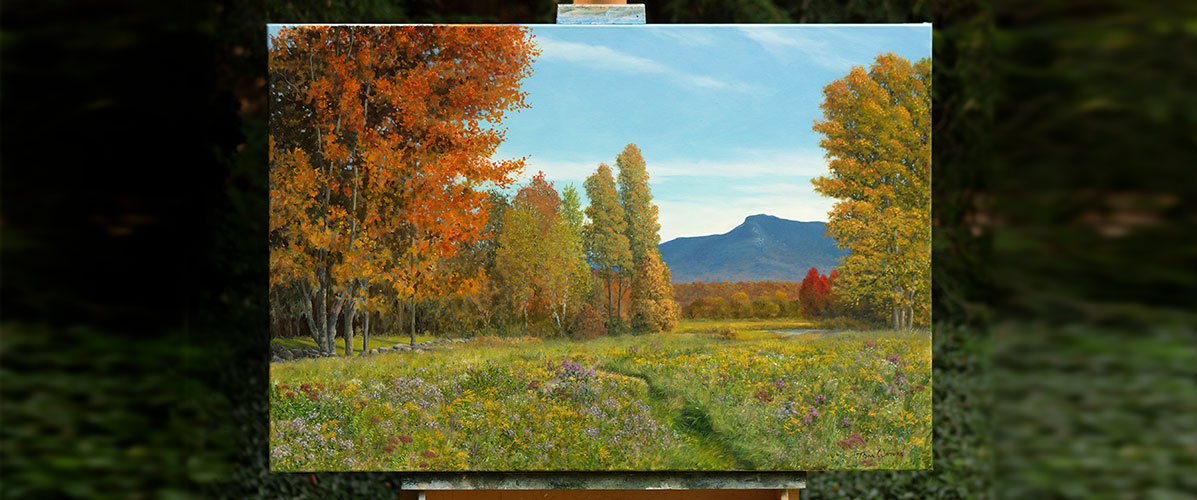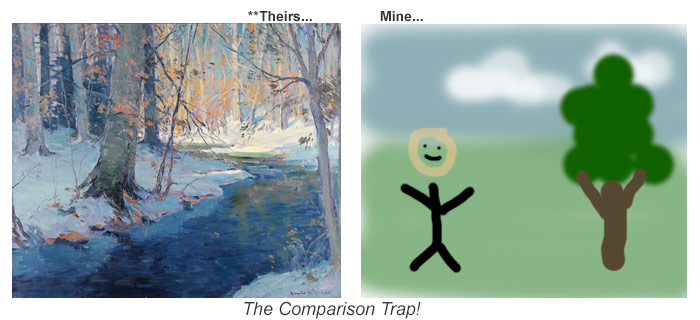After a brief visit to a couple of galleries today my wife said to me “It must be hard as an artist to be surrounded by all that art and not compare yourself to other artists.”
I work in a gallery part-time and I am surrounded by some of the best artists around, many of whom I greatly admire; Eric Tobin, Stapleton Kearns, T.M. Nicholas, Andrew Orr, Kevin Fahey, Emile Gruppe and so many others. It is a blessing and a curse. I can admire and dissect the work of other artists to try to learn how they achieve an effect or render a passage. And, I can get frustrated and wonder if I just started to late to ever achieve the same level of proficiency, to ever be “good enough” to share the same space.
She is, of course, right. It is hard not to look at other artists work and mentally wonder if I’ll ever be “that” good. I doubt there are many artists that don’t, or haven’t at some point, suffered from the same affliction. I call it “The Comparison Trap”.
It is, of course, not limited to artists. We all do this to some extent, I imagine, whether in our personal lives or our professional lives. Why does _____ make more then me, am I as fit, do I dress as well, how did they get that job, where do they go on vacation, how did they win that award, am I as good a parent, could I work there, am I as smart, as happy, etc.
Artists are notoriously self-conscious about their work and self-critical to begin with. What looks like a masterpiece to someone else may not come close to resembling the vision the artist had when they started the painting. They know. It sucks. Doesn’t matter how much others like it.
In some ways comparisons are good. It does not hurt to aspire to be better than you are in some areas, if it motivates you to take action and improve your skills, or achieve some other goal. Having a yard stick by which to measure progress can help you realize gains you’ve made, keep you focused, and on-track. But too often the comparison trap is negative. It can lead to inaction, or be demotivating. “I should.” I should be able to paint my skies that loosely, I should be able to render buildings more accurately, I should mix my colors better, I should sell more paintings, I should be better at ________.
So what advice can I offer for those who succumb to The Comparison Trap, or to avoid it altogether?
1. The first and best thing I have found, is to surround yourself with other artists. There are at least two reasons for this. One, they know what you go through and can relate to the same insecurities and comparisons so they are usually better at understanding what you are going through. Second, as artists they can offer more constructive feedback and assurances, ones that you will respect more than old Aunt Mary telling you “I Love It!” This, of course, has its drawbacks as there are other artists who are very competitive and feel the need to break others down in order to build themselves up. But they are usually easy to identify and can be avoided. Art groups or leagues are a great place to find like-minded artists that you can share experiences and get good feedback. Not “I love your work” feedback, but feedback that is helpful and moves you along to the next notch on your yardstick. Feedback that you don’t take as personal because of the knowledge and skill of the person(s) giving it. They can have insights non-artist might not have.
2. Second, find an online community that is positive. This might be a Facebook or google+ group, it might be an organization with groups of artists or those that appreciate art, or an active online community or blog where sharing of work or work in progress is allowed. But be forewarned. There are many toxic groups and communities out there. Visit YouTube and you’ll see what I mean. The trick is to enter it with thick skin and a determination that if it appears the group is not supportive you will get out and not go back. Contribute positively to these good groups, offer positive feedback to others (when requested) and be supportive yourself of their efforts, share your knowledge. Do so and you will quickly find a following. These may be more along the lines of “I love your work” than the more critical feedback you would get from a group of close artist friends, but sometimes that is just what you need when you think you can’t paint a stick figure and need to hang up the brushes.
I have had more than one “oh my god what made me think I could do this” moment only to post a photo asking for feedback and critique, and find that there are people out there who see what I do differently. They don’t see the flaws I can not seem to find a solution for, but instead see what works and then like it! Its the Sally Fields moment* “You like me, you really like me!” And in those moments, that is sometimes enough. You can turn a feeling of despair into one of hope. I may not be doing everything the way I want it to come out, but my art is reaching people in other ways. That has to be good right?
3. Third, compare yourself to yourself. Drag out the old paintings or pull up old images of work you did some years ago. Put them side by side with what you are doing now. Create your own historical gallery in your home or studio. What have you learned, how far have you come. Pretty good chance you walk away feeling you are making progress. We never “get there”. But we progress. Have a yardstick that is you. Maybe you’ll get stuck for a while, but looking back over your career will show you that you find ways to overcome those periods of less creativity. This is maybe just one of those.
4. Fourth, use the comparison to make a new plan for achieving your goals. Can’t render summer greens to save your life? Wish you could paint more like So-and-So? What’s your plan, maybe some plein air studies, maybe start your day every day for a month with a 30-minute painting focusing on achieving more realistic greens. Study those who make you feel inadequate. How did they do it? How do I learn to do it that way? Do I need to change my approach? Do I want to? (maybe its not the style you are after). Call them up and ask them, maybe they will talk with you, maybe they will paint with you!
5. Fifth, and finally, turn your attention elsewhere for a little while. If you are feeling stuck and uncreative, time to work on your marketing plan. Contact some new people, update your resume, organize your studio space, try the new paints you heard about. Get your mind off of that comparison and onto something that will help you feel you are moving forward. Stuff that you always put off is a good place to start, since doing it would remove one more negative thing hiding in the shadows of your mind.
Good work for artists is never good enough. There will always be someone better, someone more successful, someone to look up to. There is always more to learn, something else to try, a vision not yet captured. Ask other artists and they will tell you they feel the same way. Its what moves us forward. Its what makes being an artist a lifelong obsession. And ultimately it leads to our best work.

